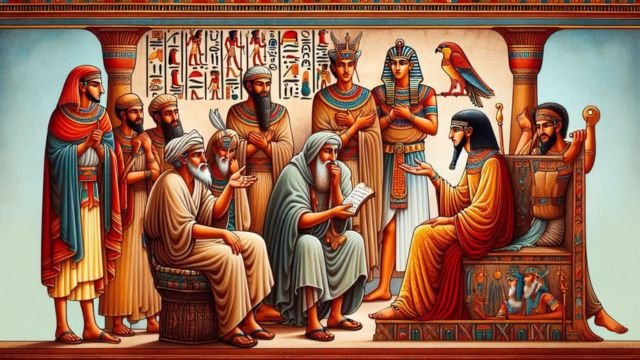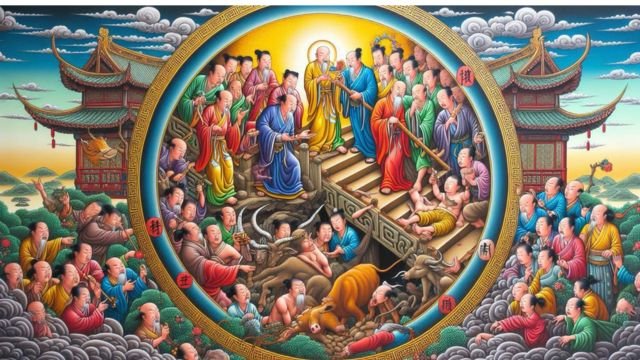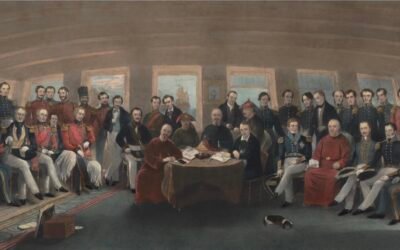If observed and implemented, the “Golden Rule” is a sufficient guarantee for true justice. Tai Ji Men tries to observe it. We ask its persecutors to do the same.
by Marco Respinti*
*A paper presented at the webinar “Justice for Tai Ji Men Is Justice for All,” co-organized by CESNUR and Human Rights Without Frontiers on February 20, 2024, United Nations World Day of Social Justice.

I will tell you a story. One day in ancient Egypt during the reign of Pharaoh Nebkaure Khety of the 10th Dynasty, who ruled between 2160 and 2130 BCE, the poor peasant Khun-Anup crossed the lands of the high steward Rensi to reach the market and procure sustenance for his family. Nemtynakht, an avid and corrupt vassal of Rensi, saw Khun-Anup and plotted to steal his donkeys and supplies. On a narrow road bordered by a river on one side and his own private fields on the other, Nemtynakht placed a cloth, forcing the peasant to step either on his property or into the water. While Khun-Anup pondered, one of his donkeys ate from Nemtynakht’s fields and the evil vassal felt authorized to claim the peasant’s donkeys and supply as his own. All the protests of Khun-Anup were useless and gained him only corporal punishments and threats of death.
The peasant managed then to appeal to Rensi. Judges didn’t care about what for them was only a petty controversy, but Rensi took the case up to the Pharaoh. The king-god of Egypt was convinced to listen to the peasant by his sublime oratory, commanding Rensi to keep Khun-Anup in the royal court and delay his case in order to continue enjoying the peasant’s refined speeches. But after nine days the peasant was desperate. He then gave a last speech and left. Impressed by his farewell words, Rensi called him back and finally paid him justice. Not only Khun-Anup re-obtained his donkeys and supplies but got all the property of the vicious Nemtynakht. Thus, the good Khun-Anup became a wealthy man and the evil Nemtynakht ended his days in misery.
This popular tale is considered the most ancient statement of what came to be known as the “Golden Rule.” It is one of the fascinating elements that makes us really think, in a warm and poetic way, that human beings come all from the same stock and origin. The “Golden Rule” is a common patrimony of so many different cultures scattered all over the world without exchange or communication. The formulation by which we know, and use, it today is contained in the Gospel according to Luke (6:31): “Whatsoever ye would that men should do to you, do ye even so to them,” in the King James Version English-speaking Christians have quoted for centuries. The Gospel according to Matthew (7:12) phrases it almost identically.

No matter how much and often it is betrayed and violated, the “Golden Rule” remains a moral standard theoretically valid for all human beings, be they religious or not. It is interesting, though, to note that, although many or even most forgot its source, it comes from the Bible, a religious text revered by the millions who are part of Christianity, the largest religion in the world today. The expression “Golden Rule” itself was coined in 1604 by British Anglican theologians Charles Gibbon (active between 1589 and 1604) and Thomas Jackson (1579–1640).
This Rule is defined as made of gold because it grants, if observed and implemented, true justice, hence unlimited peace. The Gospel according to Matthew defines it “the law.” Its secret is quite simple. No one of us wants to suffer evil. If others are expected to do to us what we do to them, to suffer no evil it is then enough to avoid doing evil. It is so simple in theory that it is difficult in practice. Probably this is why an elementary principle like this needs a divine book to be taught time and again.
In fact, the difficulty arises from the fact that human beings are not only made of clear theories but also of different practices, coming not only from the spirit but also from the flesh. They are not pure spirits but a mysterious union of soul and flesh. And, as the Gospel according to Matthew (26:41) underlines, “the spirit indeed is willing, but the flesh is weak.” This weakness accounts for the constant violation of the “Golden Rule” by human beings, who while seeing all the evils coming to them from their wrongdoings, are nonetheless incapable of refraining from imposing them on others. Of course, it is a self-harming attitude, but such is the nature of evil.
The “Golden Rule” has another formulation in the Gospel according to John (13:34–35): “I give you a new commandment: love one another. As I have loved you, so you also should love one another. This is how all will know that you are my disciples, if you have love for one another.” It is Jesus who speaks to his disciples, and in comparison to previous versions, this way of phrasing the “Golden Rule” puts its accent on the positive. It underlines not only the evil that human beings should not do, but also the good that they are called to perform. It is a decisive and even strategic approach. It is true that men and women should avoid doing evil to avoid suffering evil, but it is much more thrilling and exciting to do good because of the sublime nature of good itself. So, the “Golden Rule” becomes doing good to others as you would have others do good to you, good being gratifying in itself.
Take now Tai Ji Men. It suffered and suffers much evil by corrupt bureaucrats that, similarly to each of us, were not able to resist the temptation of doing evil to others. From the Gospel, but also from a range of different cultures dating back to the Egypt of the First Intermediate Period (c. 2181–2055 BC), we all know that this will bring evil to those corrupt bureaucrats as well. If not by humans, they will be punished by divine judges.

What is important is that, in the face of all this, Tai Ji Men did not repay evil with evil. Convinced of the inner strength of the “Golden Rule,” Tai Ji Men never stopped contributing to the common good of people and society. Why did it do it? Because Tai Ji Men’s Shifu, or Grand Master, and dizi, or disciples, do good to others as they would have others do good to them, profoundly knowing how good and love are self-rewarding. This is the way Tai Ji Men understands social justice and the way it observes this World Day of Social Justice. Tai Ji Men in fact knows that by tirelessly operating good and promoting love, good and love eventually will come to them and to all, changing the hearts and the minds.
This is the task of Tai Ji Men. Our task is to appeal to those who did and do evil to Tai Ji Men so that they stop. They should also understand the “Golden Rule” and avoid doing to others what others can one day do to them.

Marco Respinti is an Italian professional journalist, member of the International Federation of Journalists (IFJ), author, translator, and lecturer. He has contributed and contributes to several journals and magazines both in print and online, both in Italy and abroad. Author of books and chapter in books, he has translated and/or edited works by, among others, Edmund Burke, Charles Dickens, T.S. Eliot, Russell Kirk, J.R.R. Tolkien, Régine Pernoud and Gustave Thibon. A Senior fellow at the Russell Kirk Center for Cultural Renewal (a non-partisan, non-profit U.S. educational organization based in Mecosta, Michigan), he is also a founding member as well as a member of the Advisory Council of the Center for European Renewal (a non-profit, non-partisan pan-European educational organization based in The Hague, The Netherlands). A member of the Advisory Council of the European Federation for Freedom of Belief, in December 2022, the Universal Peace Federation bestowed on him, among others, the title of Ambassador of Peace. From February 2018 to December 2022, he has been the Editor-in-Chief of International Family News. He serves as Director-in-Charge of the academic publication The Journal of CESNUR and Bitter Winter: A Magazine on Religious Liberty and Human Rights.



